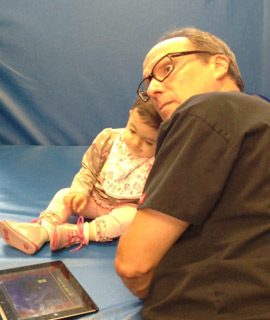
VIDEO – CHARGE Syndrome 14 month old
Published on: October 10, 2013
We recently saw this 14 month-old female for a vestibular evaluation from the UAE. She has been undergoing therapy since age 3 months. As can be seen, developmentally there is significant motor milestone delay and she is at a 2 month-old motor function without neck stabilization of head and trunk. This presents a challenge in obtaining reliable VEMP results. The co-morbidities of Audio-Vestibular dysfunction and vision are all contributing factors in the complexity of motor development. Recommendations were to follow-up with VEMP testing, as soon as the neck musculature further develops and in the meantime continue with the physiotherapy and sensory integration therapy.
CHARGE syndrome is inherited and mutations are commonly found on the CHD7 gene. The National Institutes of Health reports CHARGE occurs in approximately 1 in 8,500 to 10,000 individuals. CHARGE syndrome affects many areas of the body including: Coloboma, Heart defect, Atresia choanae, Retarded growth and development, Genital abnormality and Ear abnormality. Severity of anomalies varies greatly from one individual with this disorder to another.
Resources:
1. Gans, R. (2013), “Evaluation and Management of Vestibular Function in Infants and Children with Sensorineural Hearing Loss”, Madell J. and Flexer C. (Eds.) Pediatric Audiology: Diagnosis, Technology and Management, 2nd Edition, Thieme Medical Publishers, New York
2. Nih.gov/condition/charge-syndrome
3. www.chargesyndrome.org